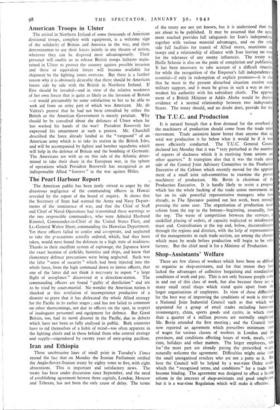The Pearl Harbour Report
The American public has been justly stirred to anger by the disastrous negligence of the commanding officers in Hawaii revealed by the report of the board of inquiry. It shows that the Secretary of State had warned the Army and Navy Depart- ments of the imminence of war, and that the Chief of Staff and Chief of Naval Operations had transmitted these warnings to the two responsible commanders, who were Admiral Husband Kimmel, Commander-in-Chief of the United States Fleet, and Lt.-General Walter Short, commanding the Hawaiian Department. Yet these officers failed to confer and co-operate, and neglected to take the precautions actually ordered, which, had they been taken, would nave found the defences in a high state of readiness. Thanks to their excellent system of espionage, the Japanese knew the exact location of airfields, batteries and ships, and knew that elementary defence precautions were being neglected. Such was the false " sense of security " which had been injected into the whole force, from the high command down to junior officers, that one of the latter did not think it necessary to report " a large flight of aeroplanes " discovered at a detection-station. The commanding officers are found " guilty of dereliction " and are ,to be tried by court-martial. No wonder the American. nation is shocked at this revelation of incompetence productive of a disaster so grave that it has dislocated the whole Allied strategy for the Pacific in its earlier stages ; and has not failed to comment on other shortcomings, not due to officers on the spot, in respect of inadequate personnel and equipment for defence. But Great Britain, too, had its naval disaster in the Pacific, due to defects which have not been so fully analysed in public. Both countries have to rid themselves of a habit of mind—too often apparent in the fighting chiefs and in those behind them who control strategy and supply—engendered by twenty years of easy-going pacifism.


























 Previous page
Previous page